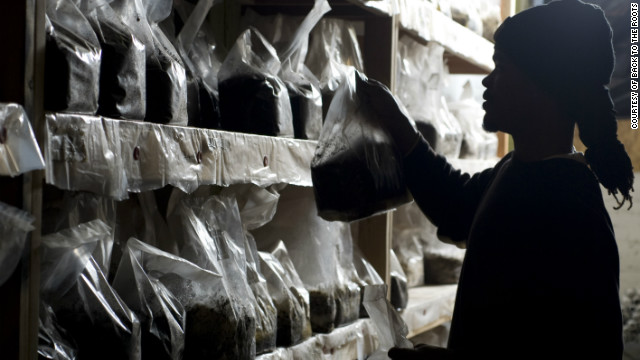
Grounds for improvement: used coffee becomes the basis for mushroom-growing kits from Back to the Roots
Seeing all this waste
pushed Dawson, 27, who formerly worked for a hedge fund, to start a
business using surplus produce. The model for Rubies in the Rubble,
her jam and chutney business, was born, with the goal using food that
would otherwise get tossed to create foods that people would buy.
"Preserves seemed almost a
natural thing to be doing with a glut of fruit and veg, because it then
lasts up to 10 months," Dawson said.
Infographic: Food waste; From farm to fork and landfill
The massive global
problem of food waste has received more attention in recent years, and
the figures are staggering. A U.N. report estimated last year that
around the world, one-third of all food produced for human consumption
is wasted.
Many food banks now
collect leftover foods from hotels and restaurants and redistribute them
to those in need. Composting has become a common method of recycling
food as fertilizer or soil amendment.
Interactive: Businesses making the most of our food waste
But businesses like
Dawson's have also cropped up to make use of food items that would
otherwise end up in landfills. Awareness campaigns have helped the
cause, she said, and change can be felt in the initiatives taken by
supermarkets and restaurants.
Waitrose, the U.K.-based
supermarket chain, in October achieved its goal of sending zero food
waste to landfills. Instead, unwanted food is donated or sent to
anaerobic digestion plants to convert the material into biogas. Other
major U.K. retailers are following suit, with Marks & Spencer
announcing similar plans.
And Dawson says consumers' attitudes have changed too.
"Two years ago, people
didn't like the word 'food waste,' because people wanted to be seen as
having the best, having the perfect thing," she said.
"Then as organic and
being homegrown started to creep in, people actually liked the
strange-shaped carrots or the small, different apples because it felt
more organic and homegrown."
In California, two
entrepreneurs saw an opportunity in the mounds of coffee grounds thrown
out each day by cafes in their own neighborhood. They now run a thriving
business based on reusing waste.
Interactive: Human misery behind high food prices
Nikhil Arora and
Alejandro Velez were business students at the University of California,
Berkeley, when they first heard in class that mushrooms could be grown
entirely on discarded coffee grounds.
The concept piqued their interest and led to the formation of Back to the Roots,
a business that has gone from farming mushrooms to selling
mushroom-growing kits, all relying on used coffee that gets thrown out
by 35 cafes in and around Berkeley.
Read: How severe weather impacts the global food supply
"Since day one, our
first vision for this company, why we fell in love with it, was this
idea of 'waste to food' and 'waste to wages,' — that you could create a
really cool company in an urban setting, create really good jobs out of
what was waste, and something about that was so powerful to us," Arora
said.
The company's main
product, a mushroom-growing kit, is a cardboard box that houses a
plastic bag filled with coffee grounds and mushroom spawn. Slit open the
bag and mist the contents with water, and pearl oyster mushrooms will
begin to grow, until they are spilling out the side of the box, reaching
their full-grown size in about 10 days.
Quiz: Test your knowledge of Xmas excess
Back to the Roots has
sold 300,000 of the kits in the U.S. at outlets like Whole Foods,
Nordstrom, and Bed Bath and Beyond stores. Arora said they use "a
massive stack" of coffee grounds per day, and it comes to about 18,000
kilograms of reused grounds per week. However he realizes it is still
but a tiny contribution to relieving the amount of food products that go
to waste.
"We know our mushroom kit's not going to solve world hunger, it's not going to themselves reduce the entire issue."
Arora hopes that growing
one's own food could bring to individuals, especially children, a
greater awareness of where food comes from.
And he says that the
idea easily engages a wide spectrum of the public, from foodies to
children to environmentally-conscious people.
"We like to say if
you're sitting on a flight, no matter who you're sitting next to, you
could talk to them about this mushroom kit," he said.
No comments:
Post a Comment